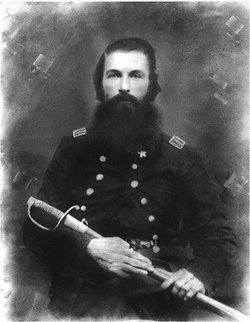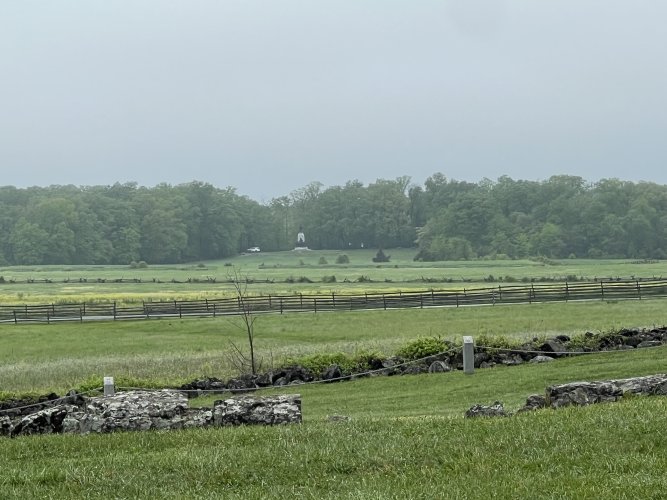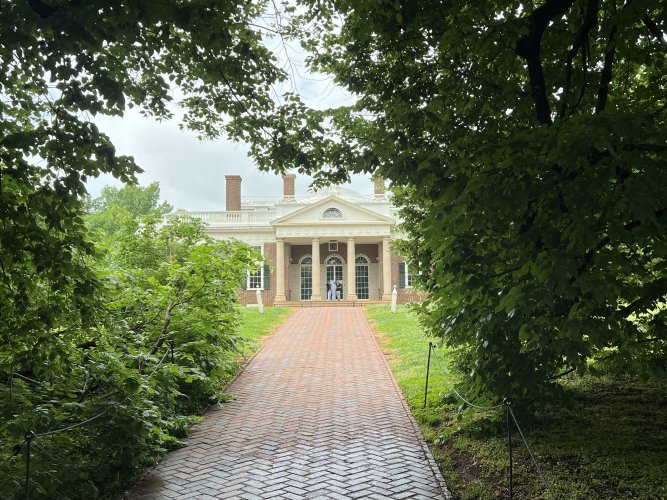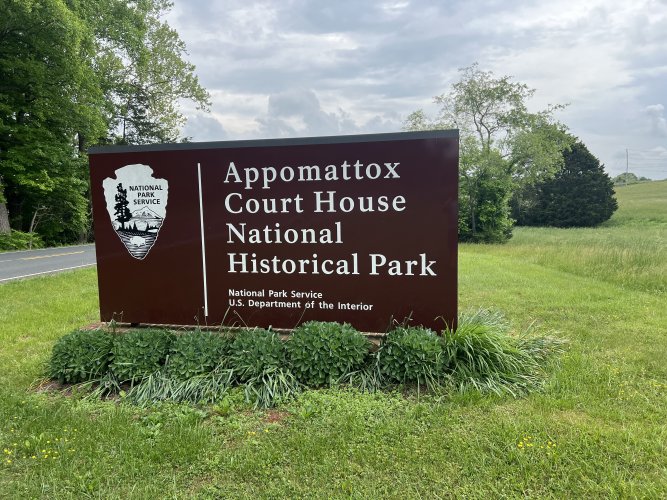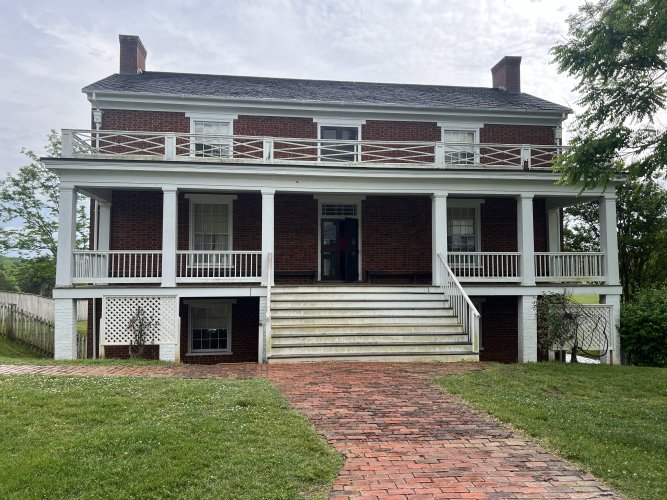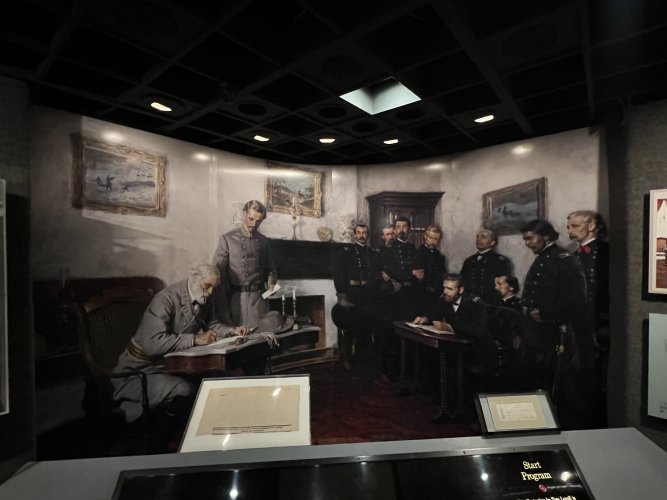Navigation
Install the app
How to install the app on iOS
Follow along with the video below to see how to install our site as a web app on your home screen.
Note: This feature may not be available in some browsers.
More options
You are using an out of date browser. It may not display this or other websites correctly.
You should upgrade or use an alternative browser.
You should upgrade or use an alternative browser.
Gettysburg
- Thread starter shrapnel
- Start date
Nick87
Well-known member
That would be an awfully interesting read.View attachment 325298
My great, great, great grandfather, Major James T. Poe, 11th Arkansas Regiment, CSA. Confederate POW at Johnson’s Island, Ohio.
I have a copy of his Civil War diary. Interesting reading. Buried in Long Branch Cemetery, Carbon County, Texas.
Happy hunting, TheGrayRider a/k/a Tom.
BrentD
Well-known member
Back then soldiers actually aimed their rifles, and knew how to shoot. They were hunters and rifleman.
I'm no Civil War expert, but I believe artillery, not muskets, accounted for the largest share of casualties. But I could be misremembering that. Either way, even in the Bronze and early Iron Ages there were battles that resulted in huge mass graves what must have been huge proportions of the total number of combatants. I don't mean to make light of modern wars, and the Ruskies and Ukrains are certainly amassing high body counts, but comparing the numbers of dead to the numbers of combatants and just the size of the regional populations, certainly makes me pause and wonder... Muskets, swords, clubs, and axes in comparison to full autos and the longest range artillery. Maybe it says more about how much more we value lives than did humans of yore.
Nick87
Well-known member
You think it has anything to do with firing lines at x amount of feet back in the day? as well as well as how far field medics have come? I'm just spit balling.I'm no Civil War expert, but I believe artillery, not muskets, accounted for the largest share of casualties. But I could be misremembering that. Either way, even in the Bronze and early Iron Ages there were battles that resulted in huge mass graves what must have been huge proportions of the total number of combatants. I don't mean to make light of modern wars, and the Ruskies and Ukrains are certainly amassing high body counts, but comparing the numbers of dead to the numbers of combatants and just the size of the regional populations, certainly makes me pause and wonder... Muskets, swords, clubs, and axes in comparison to full autos and the longest range artillery. Maybe it says more about how much more we value lives than did humans of yore.
BrentD
Well-known member
I mentioned medical in my first post, so yes on that. As for distance? I don't know. Maybe, maybe not. Were they that much shorter ranges relative to the range of their weaponry? Making an apples to apples comparison is probably an issue.You think it has anything to do with firing lines at x amount of feet back in the day? as well as well as how far field medics have come? I'm just spit balling.
Knight.54
Well-known member
It’s a haunted place for sure… my wife grew up just a few miles away and my sister and her husband lived there for a while(he’s still on the faculty at Gettysburg College) so I’ve been a few times…fascinating history.
Good thread… better than bitching about not drawing tags as a NR.
Good thread… better than bitching about not drawing tags as a NR.
Nick87
Well-known member
Missed that in the first post. I would imagine having one in the pipe while standing lined up in the wide open I'd me damn sure making it count vs having 30 in the mag. Hard to make it a fair comparison. Not a situation you or I could probably fully grasp anyhow.I mentioned medical in my first post, so yes on that. As for distance? I don't know. Maybe, maybe not. Were they that much shorter ranges relative to the range of their weaponry? Making an apples to apples comparison is probably an issue.
shrapnel
Well-known member
- Joined
- Aug 27, 2015
- Messages
- 3,002
Straight Arrow
Well-known member
That terrain and the vision of the attack in the open in the face of relentless fire made me shudder during a visit there. It was a tragic loss of human life. US citizens killing US citizens, both sides.No image of Gettysburg is complete without a look from Cemetery Ridge to the timber across the open field and try to imagine Confederate troops charging across that open field into the lines and guns of the Union Army….
View attachment 325341
shrapnel
Well-known member
- Joined
- Aug 27, 2015
- Messages
- 3,002
Sheltowee
Well-known member
Killer Angels is fine, but it is ultimately fiction. Harry Pfanz's nonfiction Gettysburg trilogy is even more compelling and firmly based in academic research:I’m a government man and went trough my agency’s “leadership institute.” I spent a couple days on Civil War battlefields with a world-renowned Civil War historian and author. Gettysburg and Antietam were both days that have and will influence the rest of my life.
To the OP, strongly encourage reading Killer Angels. It’s a fairly easy read and will make Gettysburg come alive.
@shrapnel-- if you have time for a quick jaunt down the Valley, highly recommend the New Market battlefield (https://www.battlefields.org/visit/battlefields/new-market-battlefield). Much smaller battle but heartwrenching in that a battalion of VMI cadets-- most of them between 15 and 18 years old-- was sacrificed to close a gap in the Confederate lines, then charge a Union artillery battery. Over a quarter of the battalion was killled or wounded.
fowladdict
Well-known member
- Joined
- Aug 20, 2005
- Messages
- 2,590
How many days do you suggest to spend there? This is on the destination list for the wife and I.
X13
Well-known member
- Joined
- Jul 13, 2017
- Messages
- 1,771
I live far to close to these places to have not spent much time at them. Thanks for the inspiration for some road trips with the family
shrapnel
Well-known member
- Joined
- Aug 27, 2015
- Messages
- 3,002
shrapnel
Well-known member
- Joined
- Aug 27, 2015
- Messages
- 3,002
BrentD
Well-known member
I’ve always found the idea that the WW2 Generation was “The Greatest Generation” to be a bit insulting - the Northern Civil War Generation earned that title far more in every conceivable way.
I don't know if I would agree with that. You could make the same case for the turn of the 19th century folks, the Revolutionary war generation, the European colonists generations, etc. It's the kind of title that probably says more about the bestower than the bestowed.
OntarioHunter
Well-known member
- Joined
- Sep 11, 2020
- Messages
- 5,997
As I recall Antietum had the highest casualty/acre/hour. The boys must have been standing knee deep in bodies.
I recently finished reading "24 Hours at Waterloo." An incredible book. That battle lasted only about eight hours. The devastation and brutality is really unbelievable. Almost entirely a hand-to-hand slugfest in terrible conditions. Tens of thousands who survived had to have been permanently maimed, mentally if not physically. In the present context it is hard to imagine. But those were brutal hardened times day to day even when no wars were raging (which was rare). Pandemics were commonplace. Infant mortality was only 50% in the best years. Society was barely civilized. The French guillotined folks just for public entertainment. The English were hardly any better. Google "drawn and quartered." And if you were a sailor in the British navy ... well, God help ya!
Edit: The Battle of Waterloo started around 11:30 a.m. and French were routed by 8:00 p.m., just when it was becoming dark. 39,000 casualties in eight hours, not including 14,000 horses. Most of the battlefield was knee deep in mud from previous day's heavy rains. The majority of troops had marched sixty miles during the previous two days with no rest and very little to eat or drink. The battlefield front was 4km (2 miles) long but most of the combat took place within 950 meters.
I recently finished reading "24 Hours at Waterloo." An incredible book. That battle lasted only about eight hours. The devastation and brutality is really unbelievable. Almost entirely a hand-to-hand slugfest in terrible conditions. Tens of thousands who survived had to have been permanently maimed, mentally if not physically. In the present context it is hard to imagine. But those were brutal hardened times day to day even when no wars were raging (which was rare). Pandemics were commonplace. Infant mortality was only 50% in the best years. Society was barely civilized. The French guillotined folks just for public entertainment. The English were hardly any better. Google "drawn and quartered." And if you were a sailor in the British navy ... well, God help ya!
Edit: The Battle of Waterloo started around 11:30 a.m. and French were routed by 8:00 p.m., just when it was becoming dark. 39,000 casualties in eight hours, not including 14,000 horses. Most of the battlefield was knee deep in mud from previous day's heavy rains. The majority of troops had marched sixty miles during the previous two days with no rest and very little to eat or drink. The battlefield front was 4km (2 miles) long but most of the combat took place within 950 meters.
Last edited:
This thread is about the battle of Gettysburg, and, by extension, the Civil War. It's not about the Revolution, hence the reason for centering my response to the Civil War. Certainly the case could be made for the Revolution, however, the Revolutionary War was our choice, and we certainly could have stayed in the British Empire and eventually gotten our independence without the bloodshed. The Civil War was an entirely different animal, and the death and destruction in the Civil War far outstripped that of the Revolution.I don't know if I would agree with that. You could make the same case for the turn of the 19th century folks, the Revolutionary war generation, the European colonists generations, etc. It's the kind of title that probably says more about the bestower than the bestowed.
shrapnel
Well-known member
- Joined
- Aug 27, 2015
- Messages
- 3,002
I don't know if I would agree with that. You could make the same case for the turn of the 19th century folks, the Revolutionary war generation, the European colonists generations, etc. It's the kind of title that probably says more about the bestower than the bestowed.
To every generation there was a challenge, but none was met in time and circumstance as the “Greatest Generation”
Lives were significantly different in the 20th century as each previous generation passed the torch to the next. Convenience and luxury were never before seen as it was in the post war era following a debilitating depression.
My father, born in 1910, lived much the same as any civil war family, with nothing but hard work to make a daily living to press forward to the next day. He grew up in a time, mixed with modern and frontier lives being lived at the same time in America.
He and millions of Americans met the challenge of a 10 year depression, then getting drafted at age 31 to fight in a war in places he never heard of for people he never knew.
Once the war was over he came back to Montana and forged ahead without assistance from all the agencies that exist today and made a life and raised a family with no consideration of governmental aid. He and all those people passed on an America that was never stronger or more unified.
It didn’t take long for people to selfishly ruin that greatness they carved out of a modern wilderness and freely gave it to subsequent generations with no expectation of compensation.
They were the greatest generation!
Similar threads
- Replies
- 22
- Views
- 1K




